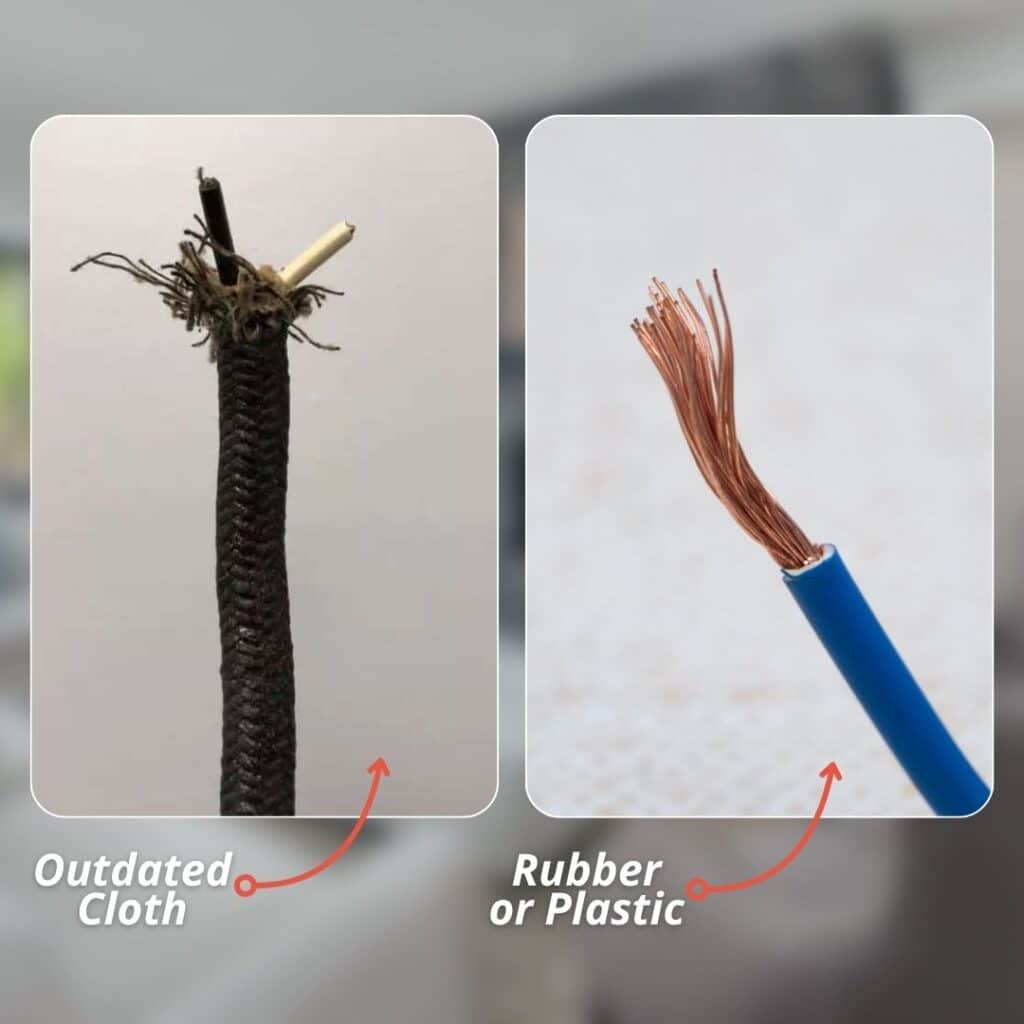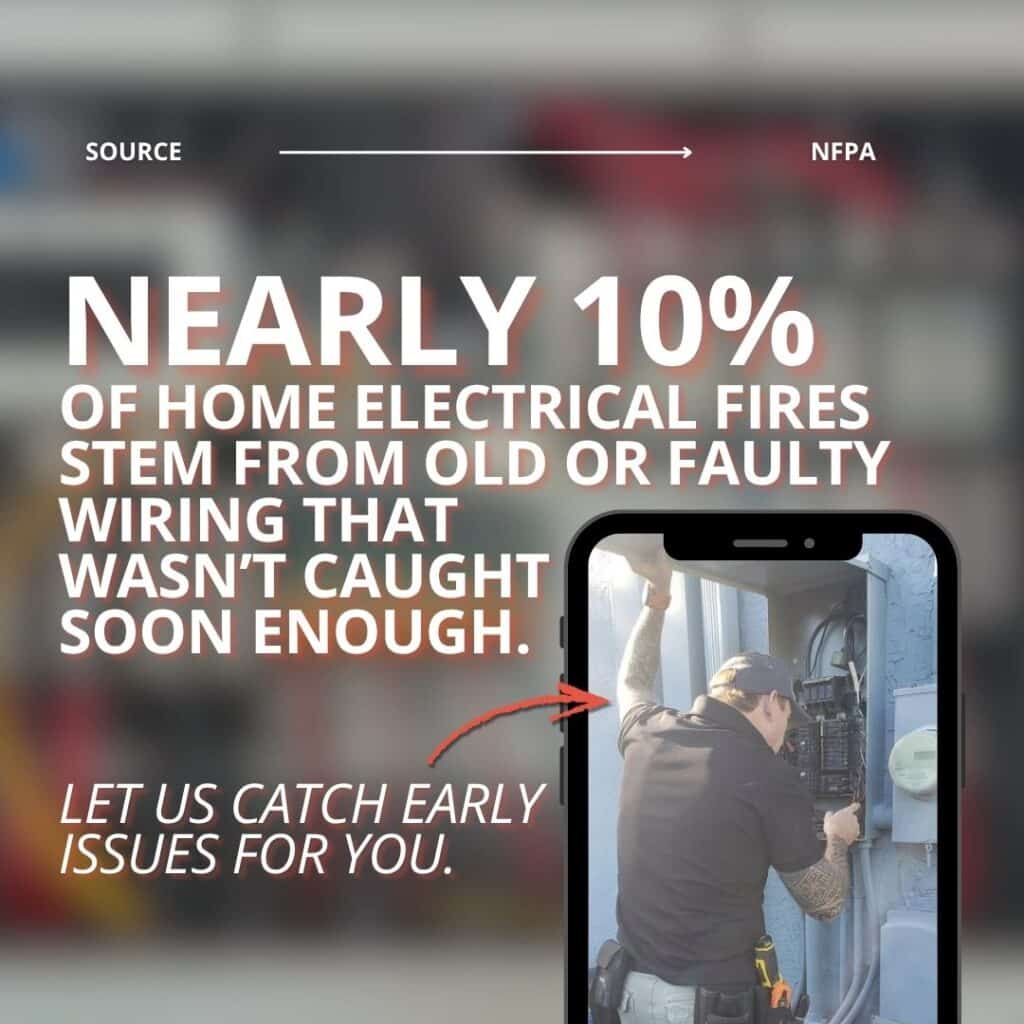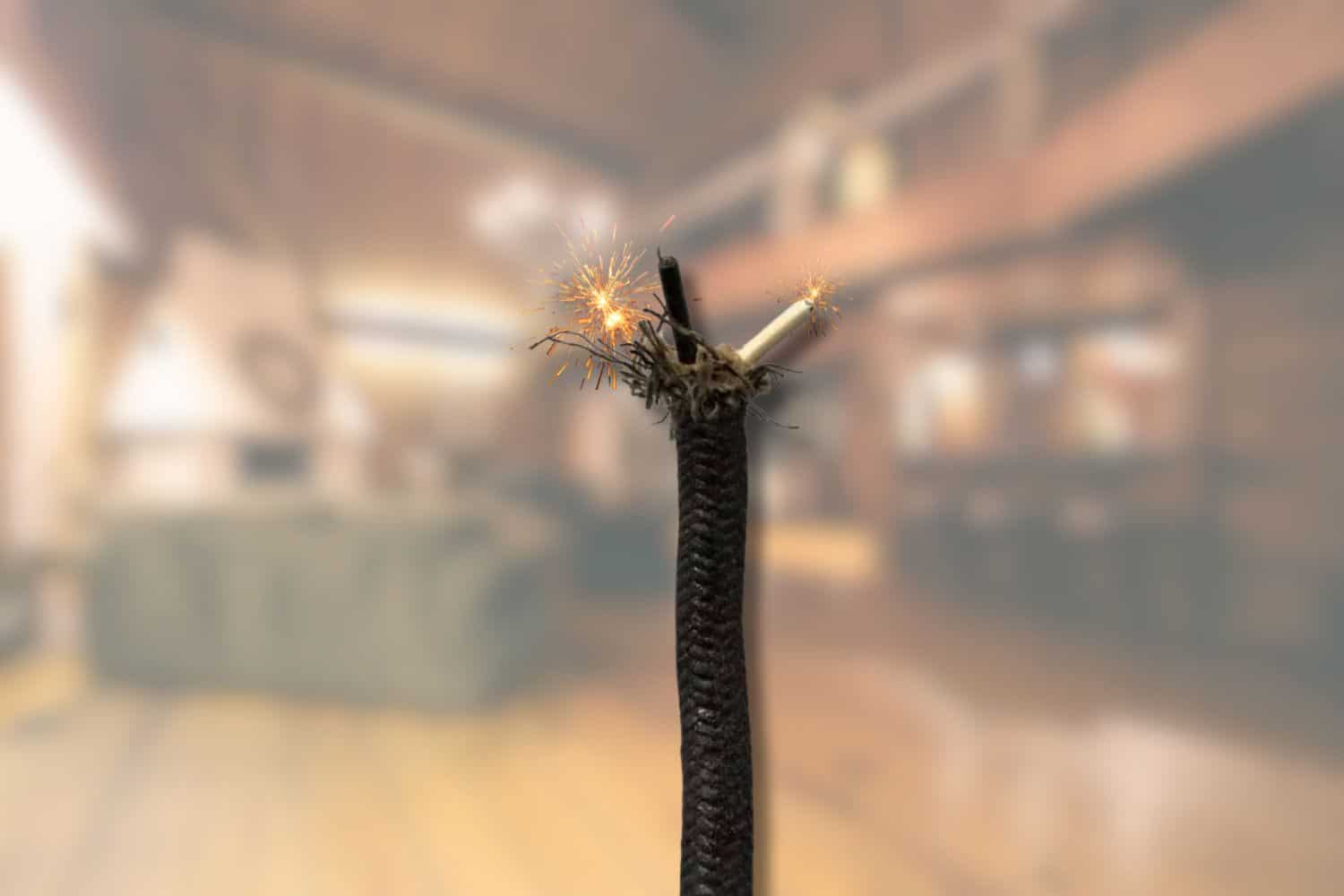If you own or are buying a home built before the 1960s, you may come across an older electrical setup called cloth wiring. Though it was standard for its time, cloth wiring doesn’t meet today’s electrical safety standards and can create real hazards if left uninspected.
Florida’s warm, humid climate speeds up the wear and tear on this kind of wiring. Over time, the cloth insulation becomes brittle, frayed, or loose, making homes more prone to shorts, sparks, or even electrical fires.
In this guide, we’ll explain what cloth wiring is, the risks it carries, how to identify it safely, and why a professional home inspection is the best way to assess your electrical system before it becomes a serious problem.
Table of Contents
ToggleWhat Is Cloth Wiring?
Cloth wiring refers to any electrical wiring where the insulation around the copper or aluminum conductors is made from woven fabric rather than modern plastic or rubber. It was commonly used in homes from the 1920s through the late 1950s.
The cloth material was sometimes treated with varnish or asphalt to make it more durable, but time and temperature eventually cause it to deteriorate.
Older systems may include:
- Knob-and-tube wiring – an early method where wires run through ceramic knobs and tubes without grounding
- Cloth-covered Romex – a later version that uses fabric insulation around early rubber coatings
- Asbestos-wrapped wiring – found in certain mid-century homes, designed to resist heat but unsafe if disturbed
Because cloth-insulated wires are now over 60 years old, many are brittle or unsafe for modern power demands.

Why Cloth Wiring Was Used
At the time, cloth was inexpensive, flexible, and easy to install. Electrical systems in the 1930s–50s didn’t have to support today’s heavy appliance loads. Builders often chose cloth wiring because:
- It met the code or standards of the era
- It handled low household demand
- It was compatible with early insulation materials
However, as homes expanded and modern devices required more electricity, these systems couldn’t keep up. When overloaded, they can overheat or fail completely.
Why Cloth Wiring Is a Concern Today
1. Fire Risk
According to the National Fire Protection Association (NFPA), nearly 10% of residential electrical fires stem from old or faulty wiring. In Florida’s humid climate, cloth insulation absorbs moisture, making it more prone to short circuits and sparking.
2. Brittle or Frayed Insulation
Decades of heat and oxidation make the fabric fragile. When insulation breaks down, exposed metal wires can touch each other or nearby surfaces, increasing the chance of electric shock or fire.
3. No Grounding
Most cloth wiring lacks a ground wire, which modern systems use to redirect stray current safely into the earth. Without grounding, a short circuit can electrify appliances or fixtures, creating a serious safety risk.
4. Rodent and Pest Damage
Cloth insulation attracts rodents and insects looking for nesting material. Chewed or damaged wiring can go unnoticed in attics or crawl spaces until it causes a short.
5. Insurance and Resale Problems
Many insurance companies refuse to cover homes with cloth wiring or charge higher premiums. Lenders may also require upgrades before approving a mortgage. A certified inspection and documentation can help new homeowners address these issues proactively.
How to Tell If You Have Cloth Wiring
You can often identify cloth wiring by looking at exposed wires in the attic, basement, or near the electrical panel. Signs include:
- Fabric-like texture instead of smooth plastic
- Brown, black, or faded cloth covering
- Paper labels such as “NMC” or “Type NM” from older cable markings
- Porcelain knobs or tubes in very old homes
Because handling wires can be dangerous, don’t try to remove coverings or touch them. Instead, note any visible cloth wrapping and call a licensed inspector or electrician for verification.
Florida’s Climate Makes the Risk Worse
Florida’s heat and humidity accelerate the breakdown of cloth insulation. In attics or crawl spaces where temperatures can exceed 120°F, old fabric becomes dry and brittle.
Moisture also increases the risk of corrosion on metal conductors. As a result, many Florida homeowners face:
- Corroded connections that cause power fluctuations
- Cracked outer sheathing near junction boxes
- Inconsistent performance of lighting or outlets
These conditions make a professional evaluation essential for safety and insurance compliance.
How Inspectors Evaluate Cloth Wiring
A home inspection through Tier-1 Pro Inspections covers your electrical system’s visible and accessible components. During an inspection, we look for:
- Exposed cloth wiring near panels, attics, or crawl spaces
- Signs of overheating, such as darkened insulation or scorch marks
- Un-grounded outlets or outdated two-prong receptacles
- Junction boxes missing covers or overcrowded with older wires
- Mixed wiring types indicate past repairs or unsafe splicing
Inspectors document findings in your report and may recommend an electrical specialist evaluation if hazards are detected.
What to Do If Your Home Has Cloth Wiring
If you confirm your home has cloth wiring, don’t panic! But take it seriously. Here’s what to do next:
1. Schedule a Full Inspection
A professional can check all the major home systems and determine how extensive the wiring is, plus whether it still performs safely. Not all cloth wiring is immediately dangerous, but age and damage matter.
2. Replace Damaged Sections First
If rewiring the whole home isn’t feasible right away, replace the most deteriorated areas near heat sources or high-use outlets first.
3. Upgrade Panels and Breakers
Older panels weren’t designed to handle modern power loads. Upgrading your breaker panel improves safety and prepares the home for future rewiring.
4. Add Grounding Where Possible
Even partial grounding improvements reduce the risk of shock or equipment damage.
5. Work with a Licensed Electrician
Electrical work in Florida must follow state codes. DIY repairs can void insurance coverage and worsen the issue.
How Replacement Works
Rewiring a home usually involves replacing old cloth-insulated cables with modern plastic-insulated NM-B cable. Electricians often open walls selectively or run new circuits through attics or crawl spaces.
The cost depends on home size, accessibility, and local labor rates. Industry reports share that a full-home rewire averages somewhere between $10,000–$30,000. Expect to pay about $5–$17 per square foot, depending on several factors.
Though it’s a significant expense, it improves safety, increases home value, and ensures compliance with insurance and electrical codes.
Cloth Wiring vs. Modern Wiring
| Feature | Cloth Wiring | Modern NM-B Cable |
| Insulation Material | Fabric with varnish or asphalt | Plastic (PVC) |
| Grounding | None | Included copper ground wire |
| Heat & Moisture Resistance | Poor | Excellent |
| Fire Risk | High | Low |
| Lifespan | 50 years or less | 75 years or more |
| Insurance Coverage | Often restricted | Fully acceptable |
Data Sources: National Electrical Code and U.S. DOE Residential Electrical Safety Standards

Signs of Trouble You Shouldn’t Ignore
If your home has older wiring, watch for these warning signs:
- Lights flickering or dimming when appliances run
- Outlets that feel warm or discolored
- A faint burning smell near outlets or switches
- Frequent tripped breakers or blown fuses
- Buzzing or crackling sounds from behind the walls
Any of these symptoms means it’s time for a professional evaluation.
Insurance and Real-Estate Implications
Insurance companies view cloth wiring as a higher risk. Some require a licensed electrician’s report before issuing or renewing a policy. Others may deny claims if outdated wiring is found to have caused a loss.
When selling, buyers’ inspectors will flag cloth wiring in their reports. Homes with upgraded electrical systems typically sell faster and closer to the asking price. Replacing or documenting the condition of your wiring helps protect resale value and smooth the closing process.
According to the Insurance Information Institute (III), homes with modernized electrical systems see up to 15% lower insurance premiums than those with outdated wiring.
Related Questions Homeowners Ask
How does electrical wiring affect a home inspection?
Inspectors evaluate visible wiring to check for outdated or unsafe systems. Aged insulation, missing grounding, or overloaded circuits are common findings that can impact safety and insurance reports.
Can other parts of my home be affected by old wiring?
Yes. Electrical problems can contribute to attic heat buildup, poor ventilation, and even foundation damage if moisture or pests enter near conduits or outlets.
Are there other outdated systems that inspectors watch for?
Alongside cloth wiring, inspectors look for aluminum wiring, outdated panels, and old HVAC setups. Each can create safety concerns similar to those caused by old wiring.
How often should I have my electrical system inspected?
Every 3–5 years, or immediately if you experience power surges, frequent breaker trips, or notice unusual odors. Regular inspections help prevent major electrical failures before they occur.
When to Call a Professional
If your home was built before 1960, or you notice signs of electrical aging, schedule an inspection now. Tier-1 Pro Inspections performs full home evaluations across Central Florida, including electrical system checks that identify outdated wiring, overloaded circuits, and safety hazards.
Our inspectors provide digital reports with clear documentation and recommendations, helping homeowners make informed decisions about repairs or replacements.
Whether you’re buying an older property or maintaining your current home, a professional inspection ensures your electrical system meets safety standards before issues escalate.
Conclusion
Cloth wiring is a piece of electrical history that doesn’t belong in a modern Florida home. While it once met the needs of early builders, it now poses risks for fire, shock, and insurance coverage.
The good news is that identifying and addressing it early is straightforward with help from experienced inspectors and electricians.
If you suspect your home still uses cloth wiring, reach out to Tier-1 Pro Inspections today. Our licensed team will provide a thorough inspection and guide you toward the safest, most practical solution for your home and budget.

